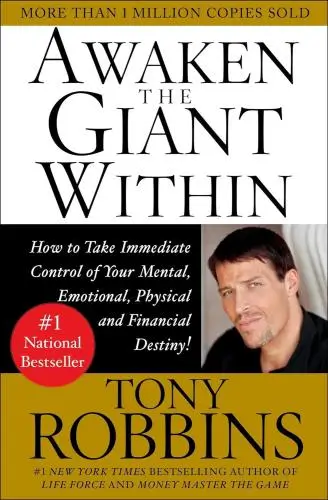Awaken the Giant Within
How to Take Immediate Control of Your Mental, Emotional, Physical and Financial Destiny!
What's it about?
Awaken the Giant Within is a powerful self-help book by renowned life coach Tony Robbins. Through practical strategies and techniques, Robbins guides readers on how to take control of their lives, master their emotions, and achieve their goals. He emphasizes the importance of setting clear goals, cultivating a positive mindset, and taking massive action to create lasting change.
About the Author
Tony Robbins is a motivational speaker, author, and life coach known for his works on personal development, leadership, and financial freedom. His writing style is engaging and practical, emphasizing empowerment and strategies for overcoming obstacles. Notable themes include harnessing the power of belief and creating lasting change.
10 Key Ideas of Awaken the Giant Within
Decide Your Destiny
Take control of your life by making conscious decisions about what you want to achieve.
Understand that every decision shapes your destiny, and even not deciding is a decision in itself.
Start by setting clear, achievable goals for yourself in all aspects of your life, whether it be personal, professional, or health-related.
Reflect on what truly matters to you and let those values guide your decisions.
This empowers you to live proactively rather than reactively, steering your life in the direction you desire.
Learn DeeperReflect on Your Values: Spend some time thinking about what truly matters to you. What are your core values? Understanding these will help guide your decisions towards a fulfilling life.
Set Clear, Achievable Goals: Break down your aspirations into specific, measurable, achievable, relevant, and time-bound (SMART) goals. This makes your dreams more tangible and attainable.
Make Conscious Decisions Daily: Every day, remind yourself that each decision, no matter how small, impacts your path. Choose actions that align with your goals and values.
Review and Adjust Regularly: Life is dynamic, so it's important to periodically review your goals and the decisions you're making. Adjust as necessary to stay on track towards your desired destiny.
Embrace the Power of Saying No: Understand that saying no to things that don't align with your values or goals is as important as saying yes to the right opportunities. This helps maintain focus on your path.
- Example
If one of your core values is health, you might decide to replace processed foods with whole foods in your diet. This decision aligns with your value of health and contributes to your long-term goal of living a healthier lifestyle.
- Example
Suppose you aim to advance in your career. You could set a goal to learn a new skill relevant to your field within the next six months. This involves deciding to dedicate an hour each day to online courses or practice, directly influencing your professional development.
Change Your Belief System
Identify and challenge limiting beliefs that hold you back from achieving your full potential.
These are often deep-seated notions we have about ourselves or the world that limit our growth.
Replace them with empowering beliefs that support your goals and aspirations.
This involves recognizing negative thought patterns, understanding their origins, and consciously choosing to adopt more positive and enabling beliefs.
By changing your belief system, you open up new possibilities for success and fulfillment.
Learn DeeperIdentify Limiting Beliefs: Start by writing down beliefs that you think are holding you back. These could be thoughts like 'I'm not good enough to achieve my dreams' or 'Success is only for the lucky ones.' Recognize these as just beliefs, not facts.
Challenge and Replace: For each limiting belief, ask yourself, 'Is this absolutely true?' More often than not, you'll find evidence to the contrary. Replace these with empowering beliefs such as 'I am capable of achieving my dreams with hard work and dedication.'
Visualize Success: Spend a few minutes each day visualizing yourself having achieved your goals. This helps reinforce your new, empowering beliefs and makes them feel more attainable.
Affirmations: Create positive affirmations based on your new beliefs. Repeat these to yourself daily, especially in the morning and before going to bed, to embed these beliefs deeply into your subconscious.
Seek Evidence: Actively look for evidence that supports your new, empowering beliefs. Success stories, testimonials, or even personal achievements can reinforce the validity of your positive beliefs.
- Example
If you've always believed that you're not a good public speaker, challenge this by joining a local Toastmasters club or a public speaking course. As you improve, replace the belief with 'I am becoming a confident and effective public speaker.'
- Example
Suppose you believe that you're not cut out for entrepreneurship because you fear failure. Challenge this by researching and reading stories of successful entrepreneurs who failed multiple times before succeeding. Replace your belief with 'Every failure is a step closer to success.'
Use the Power of Decision Making
Harness the power of decision making by being decisive and taking action.
Understand that indecision leads to inaction and missed opportunities.
When faced with a decision, weigh your options quickly and choose a course of action.
Commit to your decision and take immediate steps to implement it.
This practice builds confidence and momentum, helping you to move forward towards your goals.
Learn DeeperSet a time limit for decision-making: To avoid overthinking, give yourself a specific timeframe to make a decision. This could be 10 minutes for smaller decisions or up to a day for more significant ones.
List pros and cons: Quickly jot down the advantages and disadvantages of each option. This helps clarify the potential outcomes and simplifies the decision-making process.
Trust your gut feeling: After you've considered the logical aspects, take a moment to listen to your intuition. Often, your gut feeling can guide you towards the right choice.
Take small steps immediately: Once you've made a decision, identify the smallest action you can take right away to move towards implementing it. This builds momentum and reinforces your commitment.
Reflect on past decisions: Regularly review decisions you've made to understand what worked and what didn't. This reflection improves your decision-making skills over time.
- Example
Imagine you're deciding whether to take a new job offer. You set a decision deadline for 24 hours, list the pros (better pay, more interesting work) and cons (longer commute, less familiar team), consult your gut feeling, and decide to accept. Immediately, you draft your resignation letter for your current job and plan how to introduce yourself to your new team.
- Example
You're considering starting a fitness routine but can't decide between joining a gym or exercising at home. You give yourself 30 minutes to research and think it over, list the pros and cons of each option, and decide to start with home workouts to save money. You then download a fitness app and schedule your first workout session for the next morning.
Master Your Emotions
Learn to control your emotional responses to events and circumstances.
Recognize that while you cannot always control what happens to you, you can control how you react.
Develop strategies for managing negative emotions such as anger, frustration, or sadness.
Practice mindfulness, deep breathing, or other relaxation techniques to maintain emotional balance.
By mastering your emotions, you enhance your ability to respond to situations in a constructive and positive manner.
Learn DeeperIdentify Your Triggers: Start by recognizing the situations or events that typically trigger negative emotions in you. It could be traffic jams, work deadlines, or certain conversations. Awareness is the first step towards control.
Pause Before Reacting: When you feel a strong emotion, take a moment to pause. This gap between stimulus and response gives you the opportunity to choose a more constructive reaction. Counting to ten or taking a few deep breaths can be incredibly effective.
Reframe Your Perspective: Try to view challenging situations from a different angle. Ask yourself what you can learn from this experience or how it might actually be an opportunity for growth. Changing your perspective can change your emotional response.
Practice Gratitude: Make it a habit to focus on the positive aspects of your life. Keeping a gratitude journal where you write down things you're thankful for each day can shift your focus away from negative emotions.
Develop a Relaxation Routine: Incorporate relaxation techniques into your daily routine. This could be meditation, yoga, deep breathing exercises, or even a simple walk in nature. Regular practice helps in maintaining emotional balance.
- Example
Imagine you're stuck in a traffic jam and start feeling frustrated. Instead of succumbing to anger, you take deep breaths, focus on the music you love, or an audiobook, turning the situation into a more pleasant experience.
- Example
You receive criticism at work and immediately feel defensive and upset. Instead of reacting harshly, you take a moment to consider the feedback constructively, asking questions to understand better and using it as a stepping stone for improvement.
Create a Compelling Future
Visualize a compelling future that motivates and excites you.
Use the power of visualization to create a vivid mental image of your ideal life, including your career, relationships, health, and personal achievements.
Imagine waking up each morning in a space that inspires you, filled with natural light and the things you love.
Picture yourself in a fulfilling career that aligns with your passions and values, where you feel challenged and appreciated.
Envision the relationships in your life—friends and family who support and uplift you, sharing laughter and meaningful moments together.
See yourself in optimal health, full of energy and vitality, engaging in activities that bring you joy and fulfillment.
Visualize your personal achievements, whether they are completing a marathon, writing a book, or traveling to new places.
Make this vision as detailed as possible, incorporating all your senses to make it feel real.
Revisit it regularly to reinforce your commitment to making it a reality.
This practice helps to keep you motivated and focused on your long-term goals.
Learn DeeperSet aside time for visualization: Dedicate a few minutes each day, preferably in the morning or before going to bed, to close your eyes and vividly imagine your ideal future. Focus on all aspects of your life, such as career, relationships, health, and personal achievements.
Create a vision board: Collect images, quotes, and symbols that represent your goals and aspirations. Place them on a board where you can see them daily. This serves as a constant reminder and source of motivation towards achieving your compelling future.
Write down your goals: Make a detailed list of what your compelling future looks like. Include short-term and long-term goals. Writing them down not only helps clarify your vision but also makes it feel more tangible and achievable.
Practice gratitude: Regularly acknowledge and appreciate how far you've come towards achieving your vision. This positive reinforcement encourages persistence and keeps you grounded in your journey.
- Example
Imagine you're aiming for a promotion at work. Each day, spend time visualizing not only the moment you receive the promotion but also the steps you're taking to get there, such as leading successful projects or enhancing your skills.
- Example
If your goal is to run a marathon, visualize yourself crossing the finish line, the training sessions, and the lifestyle changes you're making to improve your stamina and health. This mental rehearsal can boost your motivation and commitment.
Deeper knowledge. Personal growth. Unlocked.
Unlock this book's key ideas and 15M+ more. Learn with quick, impactful summaries.
Read Full SummarySign up and read for free!
Awaken the Giant Within Summary: Common Questions
Experience Personalized Book Summaries, Today!
Discover a new way to gain knowledge, and save time.
Sign up for our 7-day trial now.
No Credit Card Needed

Similar Books

The Decision Book
Mikael Krogerus
This is Going to Hurt
Adam Kay
The ^AOxford Handbook of Job Loss and Job Search
Ute-Christine Klehe PhD
Job Interviews For Dummies®
Joyce Lain Kennedy
Job Interviews In A Week
Alison Straw
Handbook of Career Development
Gideon Arulmani
The Company She Keeps
Georgia Durante
The Millionaire Fastlane
MJ DeMarco
Losing My Virginity
Richard Branson
Crush It!
Gary VaynerchukTrending Summaries

Peak
Anders Ericsson
Never Split the Difference
Chris Voss
Smart Brevity
Jim VandeHei
The Psychology of Money
Morgan Housel
The First 90 Days
Michael D. Watkins
Atomic Habits
James Clear
Thinking, Fast and Slow
Daniel Kahneman
The Body Keeps the Score
Bessel van der Kolk M.D.
The Power of Regret
Daniel H. Pink
The Compound Effect
Darren HardyNew Books

Forex Trading QuickStart Guide
Troy Noonan
Comprehensive Casebook of Cognitive Therapy
Frank M. Dattilio
The White Night of St. Petersburg
Michel (Prince of Greece)
Demystifying Climate Models
Andrew Gettelman
The Hobbit
J.R.R. Tolkien
The Decision Book
Mikael Krogerus
The Decision Book: 50 Models for Strategic Thinking
Mikael Krogerus
Fichte
Johann Gottlieb Fichte
Do No Harm
Henry Marsh

